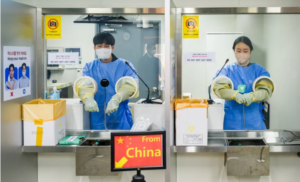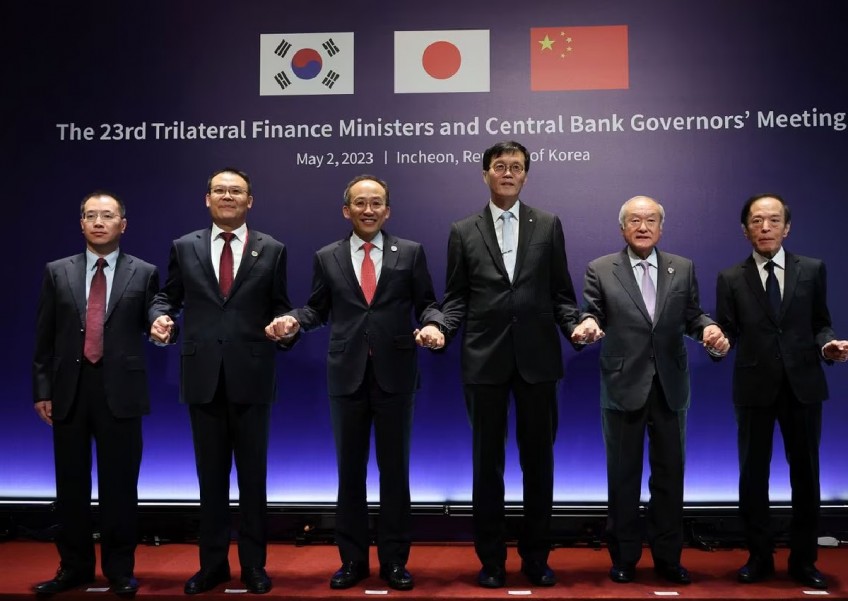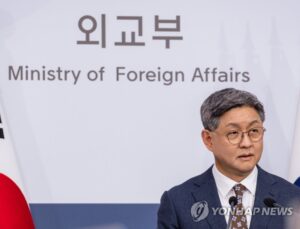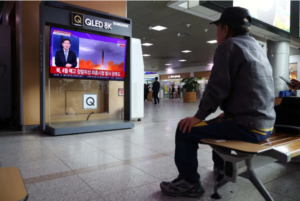Articles
China and South Korea began 2023 with the temporary imposition of tit-for-tat restrictions by both governments on travel to the other country after China lifted its zero-COVID policy. Although the restrictions proved temporary, they pointed to the reality of a sustained downward spiral in China-South Korea relations accompanied by increasingly strident public objections in Chinese media to the Yoon Suk Yeol administration’s steps to redouble South Korean alignment with the United States regarding Indo-Pacific strategy, supply chain resiliency, and shared values. South Korean Minister of Foreign Affairs Park Jin’s congratulatory call to newly appointed Chinese Minister of Foreign Affairs Qin Gang on Jan. 9 was one of the few positive senior-level interaction between the two countries in early 2023; by the end of April, the main diplomatic interactions between China and South Korea had devolved into a dueling exchange of private demarches and public assertions that the other side had committed a “diplomatic gaffe.”
As Yoon took steps to strengthen South Korean ties with NATO, stabilize relations with Japan, and upgrade efforts with the US to deter North Korea from continued nuclear development, Chinese criticisms of South Korea became increasingly ominous. They culminated in a stern Chinese diplomatic response to Yoon’s interview with Reuters on April 19 in which he characterized a possible cross-strait conflict between mainland China and Taiwan as a global security issue.
Meanwhile, the 75th founding anniversary of North Korea’s Korean People’s Army (KPA) in February and China’s National People’s Congress (NPC) confirming Xi Jinping’s third term as president in March drove symbolic exchanges of support between Chinese party-state and military leaders and their North Korean counterparts. The continued lack of a unified UN response to North Korean missile provocations renewed calls for Chinese “responsibility” and “influence” and Beijing’s reassertions of Pyongyang’s own “insecurity.” The arrival of Chinese Ambassador to North Korea Wang Yajun in Pyongyang, delayed for two years following his appointment due to pandemic-related quarantines, may presage a broader opening for China-North Korea humanitarian exchanges alongside concerns about North Korea’s ongoing military development.
A Rough Start to 2023 and Steady Deterioration in China-South Korean Relations
2023 got off to a rocky start for China-South Korea relations following the South Korean Ministry of Health and Welfare’s decision to impose restrictions on Chinese travelers to South Korea in response to China’s December 2022 decision to abandon its zero-COVID policy and reports that Chinese hackers attacked a dozen South Korean academic institutions. China’s opening resulted in a spike in COVID-19 cases within China and generated concerns outside China that new COVID variants could generate another global wave of sickness. South Korea joined the United States, Japan, and many other countries in imposing health requirements on Chinese travelers, including mandatory COVID tests and quarantines for those with positive test results. Although South Korean restrictions on Chinese visitors were designed to monitor and contain the possible spread of new variants, China responded harshly and reciprocally, slapping similar restrictions on South Korean travelers to China. By mid-February, both sides had lifted pandemic-related restrictions, but the incident proved to be an accurate indicator of a broader downturn in China-South Korea relations that revolved mainly around China’s response to South Korean efforts to align more closely with the United States.

Figure 1 South Korea imposes restrictions on Chinese nationals travelling to the country. Photo: Kim Jae-Hwan/SOPA Images/LightRocket/Getty Images
In the wake of China’s sensitive response to the imposition of temporary restrictions on the travel of its citizens, Chinese media reacted with unusual sensitivity and intensity to a series of Yoon administration policy measures, all of which were connected with Yoon’s efforts to strengthen relations with the United States. First, Chinese media reacted sensitively to NATO Secretary General Jens Stoltenberg’s visit to Seoul. Stoltenberg’s visit followed up on Yoon’s participation in the NATO summit held in Spain the previous June, but Global Times reacted to Stoltenberg’s comments on North Korea-related nuclear issues and to the idea of closer cooperation between South Korea and NATO, stating that “Nuclear sharing is just an excuse with which NATO’s grip can be extended to Northeast Asia in an imposing manner.” In addition, China’s foreign ministry spokesperson sent a veiled warning regarding reports that South Korea might join the Quad by commenting that “state-to-state cooperation needs to be consistent with the trend of peace and development, rather than be about putting up exclusionary blocs.”
In response to Yoon’s March 1 speech signaling his intent to improve relations with Japan, Chinese media commentators such as prominent Global Times columnist Hu Xijin responded that the South Korean government is strategically “sleepwalking” and unnecessarily limiting its options by moving too close to the United States and Japan. Hu argued that “South Korea can stay stable and not become a pawn of the US, as it should be one of the players in the complex chess game in Northeast Asia.”
Another major South Korea-related topic of coverage in Chinese media has been the impact on South Korean semiconductor firms of the US “attempt to crack down on China by weaponizing the chip supply chain.” China has been concerned with US efforts to strengthen supply chain resiliency and deny China access to cutting edge technology such as the Chip 4 alliance. In conjunction with US Undersecretary of State for Economic Growth, Energy, and the Environment Jose Fernandez’s visit to Seoul, Chinese coverage “alerted” South Korea not to bend to US pressure, editorializing that “China is where South Korea’s real interests lie, and Seoul’s best strategy is to balance its ties between China and the US.” Noting that Samsung’s profits declined in the first quarter of the year and that global semiconductor sales dropped by over 20% in February, the Global Times concluded that for US allies in Asia, “The economic damage now may serve as a timely reminder that China, South Korea, and Japan working together should come first, rather than the latter two countries falling in line with US strategy that goes against their own economic interests.”
A Structural Shift in China-South Korea Bilateral Trade
A combination of shifts in semiconductor demand, US imposition of new export controls on China, and a sluggish technology sector spelled trouble for declining South Korean export volumes and resulted in a precipitous drop in South Korean chip exports to China. South Korea’s Ministry of Trade, Industry, and Energy (MOTIE) reported a 16.6% year-on-year drop in South Korean exports to $46.3 billion in January 2023, led by a 44.5% plunge in chip sales to $4.8 billion. South Korea’s exports to China dropped by 31.4% year-on-year to $9.2 billion, led by a 46.6% plunge in semiconductor exports. These headline numbers point to structural drivers of a China-South Korea trade relationship that is experiencing a shift from a longstanding bilateral trade balance in favor of South Korea to one that favors China.
Several South Korean reports on trends in economic relations with China during this period help provide a greater understanding of factors accompanying this shift. A survey by the Korea Institute for Industrial Economics and Trade of 406 South Korean firms in China reveals that almost 10% were considering leaving China due to China’s economic slowdown, rising labor costs, and intensifying US-China competition. Among firms surveyed, only 27.3% and 14.5% reported increases in sales in 2021 and 2022, respectively, and 62% reported a decrease in profitability in 2022. South Korean companies reported increased localization of sourcing for materials, but greater difficulties in doing business in China.

Figure 2 Trilateral Finance Ministers and Central Bank Governors’ Meeting with China and Japan in May 2023. Photo: Reuters
According to the Korea International Trade Association (KITA), China accounted for only 22.8% of South Korea’s total exports in 2022 compared to 25.3% the previous year, a significant reduction in South Korea’s overall trade dependency on China. The Korea Center for International Finance released a report entitled “Analysis and Implications of South Korea’s Contraction in Exports to China,” noting that South Korean exports to China declined by 4.4% in 2022, after having grown an average of 6.5% annually between 2017 and 2021. The report concluded that Chinese and South Korean exports are directly competitive in many third-country markets. A separate survey by KITA revealed that 41.5% of Korean exporters viewed China as their biggest competitor, while only 11.9% named Japanese companies as their biggest competitor.
In February, South Korea’s Minister of Economy and Finance Choo Kyung-ho attributed South Korea’s slumping exports during the first part of the year to higher energy prices, falling chip shipments, and lower demand from China. He projected that South Korea may not resume having a trade surplus with China, but pointed to China’s reopening as a factor that might bolster both South Korea’s economy and the China-South Korea trade balance. KITA estimated that China’s economic recovery might reach 6.9% growth in the second quarter of 2023 and that its recovery could raise South Korea’s economic growth by 0.16% and exports by 0.55% in 2023. However, an April report by the Bank of Korea assessed that the impact of China’s economic recovery on neighboring countries was weaker than expected, in part due to the sluggish recovery of South Korean IT exports to China.
At the beginning of March, Deputy Trade Minister Jeong Dae-jin met China’s Vice Minister of Commerce Li Fei in Seoul for the first time since June 2019 to discuss cooperation on supply chains, bilateral trade and investment, and the creation of a favorable business environment, marking a return to regular bilateral trade consultations. In addition, South Korea hosted the first Trilateral Finance Ministers and Central Bank Governors’ Meeting with China and Japan in four years on May 1 and 2. The meeting reviewed macroeconomic and financial market developments, regional financing arrangements and financial safety nets, and macroeconomic surveillance conducted through the ASEAN Plus Three Macroeconomic Research Office (AMRO).
Beijing and Pyongyang Exchange Words of Strategic Partnership
China’s Ambassador to North Korea Wang Yajun started official duties in April amid ongoing sanctions on Pyongyang, stalled denuclearization talks, and rising speculation about China-North Korea trade resumption. COVID restrictions delayed Wang’s arrival for more than two years since his appointment in February 2021. In a meeting with Workers’ Party of Korea (WPK) International Affairs Department Director Kim Song Nam on April 8, Wang delivered Xi Jinping’s message to Kim Jong Un promoting China-North Korea strategic cooperation. Xi reiterated his support in another letter to Kim four days later.
Both messages responded to Kim’s March 10 letter congratulating Xi on securing an unprecedented third term as China’s president. China’s March 2023 NPC confirmed this and other appointments, driving similar exchanges between Chinese and key North Korean leaders including Premier Kim Tok Hun and Supreme People’s Assembly Standing Committee Chairman Choe Ryong Hae. Foreign Minister Choe Son-hui extended her congratulatory message to Chinese Foreign Minister and new State Councilor Qin Gang on March 12. This symbolic consolidation of strategic ties extended from party-state to military contacts. Chinese Defense Minister Wei Fenghe sent a letter to North Korean counterpart Kang Sun-nam in February, when Pyongyang celebrated the KPA’s 75th founding anniversary and displayed North Korea’s nuclear advancements through a military parade.
North Korean Threats and Regional Security Cooperation
Kim Jong Un began the year by declaring at a WPK meeting the need for an “exponential increase of the country’s nuclear arsenal.” A range of missile activities from February continued to defy multiple UN resolutions. North Korea’s latest weapons tests featured the Hwasong-18 ICBM on April 12, prompting US-South Korean air drills. It followed ICBM launches on Feb. 18 and March 16, and a March 19 short-range ballistic missile launch that raised concerns for simulating tactical nuclear weapons use. North Korean military provocations intensified that month as South Korea resumed live military exercises with the United States between March 13 and 23, ending a five-year suspension under the Moon Jae-in administration.
Addressing an April 17 UN Security Council (UNSC) session, South Korean Ambassador Hwang Joon-kook called for stronger “responsibility” of UNSC permanent members and nuclear weapon states. The UNSC held its first meeting on North Korea this year on Feb. 20 after ten such meetings last year failed to produce results. US Ambassador to the UN Linda Thomas-Greenfield called the failure “not collective” but “specific,” tracing to “two veto-wielding members of this Council who have repeatedly shut down all efforts at a meaningful response.” As China’s Deputy Permanent Representative to the UN Dai Bing affirmed, Beijing’s response remained unchanged, blaming “highly provocative” US alliance activities for fueling North Korea’s “sense of insecurity.” The UNSC’s February meeting failed to coordinate an immediate response condemning Pyongyang’s first ICBM launch this year and subsequent tests.
At a White House press briefing on April 6, National Security Council Coordinator for Strategic Communications John Kirby reiterated calls for Chinese responsibility, stating “We know that China has influence in Pyongyang.” North Korean missile tests through diversified platforms drove South Korean media warnings on the “nuclear game of chicken” and need to “brace for contingency” by strengthening the US-South Korea alliance and trilateral cooperation with Japan. US Deputy Secretary of State Wendy Sherman vowed such joint deterrence in talks with South Korean and Japanese counterparts in Washington on Feb. 13.
China Responds to Yoon’s Comments on Taiwan and the Biden-Yoon Summit
China’s increasingly ominous public warnings and misgivings regarding the Yoon administration’s series of moves to more closely align with the United States in the context of US-China rivalry finally lit the fuse of Chinese criticism of Yoon himself. It should not be surprising that the issue that lit the fuse came in an interview with Reuters less than a week in advance of the US-South Korea summit. Yoon responded to a question about Taiwan by saying that “the Taiwan issue is not simply an issue between China and Taiwan but, like the issue of North Korea, it is a global issue.” Yoon’s comment deviated from longstanding South Korean policy that accepted China’s characterization of the Taiwan issue as an internal matter based on its one-China principle, provoking a strong response from Beijing.

Figure 3 South Korea, China exchange harsh words over Yoon’s remarks on Taiwan. Photo: Yonhap
The Chinese foreign ministry spokesperson responded to a question from Yonhap News Agency by reiterating that “the Taiwan question is purely an internal affair at the core of China’s core interests . . . We hope the ROK side will follow the spirit of the China-ROK Joint Communique on the Establishment of Diplomatic Relations, stay committed to the one-China principle, and prudently handle matters related to the Taiwan question.” South Korea’s foreign ministry spokesman responded that China had committed a “serious diplomatic discourtesy” by objecting to “our leader’s mention of the universal principle that we oppose the change of the status quo by force.”
Both governments exchanged diplomatic demarches. Chinese Ambassador to South Korea Xing Haiming was called in to see First Vice Minister Chang Ho-jin while South Korean Ambassador to China Chung Jae-ho was called to the office of Chinese Vice Minister Sun Weidong. The Chinese Embassy in South Korea released a lengthy statement explaining how the Taiwan issue was completely different from the Korean Peninsula issue.
A Global Times editorial strongly criticized Yoon’s foreign policy outreach to the United States and Japan, South Korean objections to Chinese outrage over Yoon’s remarks, and the issue of US spying on South Korea, asserting that “China has shown real and even extra diplomatic respect to South Korea, and we hope South Korea can show some self-respect.” Xiang Haoyu of the China Institute of International Studies wrote that “the conservatives in South Korea seem to be losing their awareness of the country’s unique geopolitical situation in the midst of their inflated great power mentality.” Global Times columnist Hu Xijin argued that “China should maintain sufficient strategic determination and not dance with the Yoon government. We should stick to the basic direction and logic of China-South Korea relations. The attitude of the Chinese side is consistent. The Yoon government wants to go against the general trend, but in the end it will find that the trend is stronger than what it can do.”
The South Korean embassy sent response letters on May 5 to editors at Huanqiu Shibao, the People’s Daily, and the Global Times, charging that “by using sensational, provocative, and inappropriate language, your papers disparaged our president as well as the foreign policy of our government aimed at bringing peace and stability to the region, and did so from an extremely biased viewpoint without objective evidence.”
Following the US-South Korea summit, Chinese criticisms of the US-South Korea alliance under Yoon were unflinching. Renmin University’s Jin Canrong stated that Yoon’s “unwise policy is unsustainable, because it goes against the national interests of South Korea.”
A Period of Security and Economic Challenges on the Peninsula
As Commander of the US Indo-Pacific Command Adm. John Aquilino described at a House Armed Services Committee hearing on April 18, the current decade is a “period of increased risk” featuring Russia’s war on Ukraine, North Korean military aggression, and China’s “nuclear and conventional buildup” and “malign behavior.” Heightened threat perceptions have amplified South Korean domestic debates on extended deterrence and South Korea’s own nuclear buildup as the US-South Korea alliance marks its 70th anniversary this year. Reflecting on the second round of US-South Korea missile defense drills in February and a post-Ukraine “global security crisis,” conservative voices further insisted that “the Seoul-Tokyo security cooperation should be expanded beyond normalization” given North Korea’s ability to threaten both countries with its advancing missile technology.

Figure 4 News about North Korea launching a ballistic missile in April 2023. Photo: Kim Hong-Ji/Reuters
Other views emphasize humanitarian rather than military responses to the North Korean threat. Unprecedented food shortages triggered North Korean military mobilization to boost production, as the New York Times reported in March. Grain production tops Kim Jong Un’s economic priorities for 2023, reflecting enduring challenges of global sanctions, state-led development, and natural disasters exacerbated by COVID-19. Reported signs of post-pandemic economic reopening include renewed efforts to draw Chinese investment, including through the Kaesong Industrial Complex.
However, even more vexing for the future of China-South Korea diplomatic relations may be the diplomatic fallout from the US-South Korea summit and China’s bitter response to both Yoon’s comments on Taiwan and willingness to call out China for not implementing UN sanctions on North Korea. Despite Yoon’s consistent characterization of relations with China as a positive-sum game in which both sides may proceed based on mutual interests, China’s read of South Korea under Yoon appears to have darkened considerably during this period.
Even more worrisome are Chinese characterizations of South Korea’s alignment with the United States and Japan as detrimental to South Korea’s own security interests and the deep strategic logic of balance between the US and China that has characterized South Korea’s traditional foreign policy approach. But China’s dark warnings regarding the destabilization of peninsular security are clearly bounded, as Chinese policy toward North Korea over decades has clearly demonstrated. At the time that the South Korean ambassador to China presented his credentials to Xi Jinping, he conveyed a message of invitation to Xi to visit Seoul. But a prolonged stalemate in relations between Beijing and Seoul now seems more likely than rapprochement, perhaps for the duration of the Yoon administration.
Jan. 2, 2023: South Korea suspends short-term visa applications from its consulates in China, restricts new flights from China to Korea, imposes testing requirements for travelers from China, and tightens quarantine measures for all travelers from China.
Jan. 6, 2023: Chinese Embassy in South Korea releases a statement protesting the visit of several South Korean lawmakers to Taiwan.
Jan. 9, 2023: Chinese and South Korean Foreign Ministers Qin Gang and Park Jin hold their first telephone talks.
Jan. 11, 2023: China stops issuing certain types of visas for South Korean citizens.
Jan. 17, 2023: Kim Jong Un receives a letter from Xi Jinping appreciating Kim’s condolence message on Jiang Zemin’s death.
Jan. 20, 2023: Ambassador Xing Haiming holds meetings with ROK Deputy Speaker of the National Assembly Kim Young-joo and Chung Woo-taik.
Jan. 25, 2023: Korea Internet & Security Agency reports a Chinese cyberattack against 12 South Korean academic institutions on Jan. 22.
Jan. 26, 2023: Two Chinese warplanes fly through overlapping parts of China and South Korea’s air defense identification zones.
Feb. 1, 2023: Chinese authorities reimpose mandatory COVID-19 tests for travelers from South Korea.
Feb. 9, 2023: Fourth China-South Korea-Japan sports ministers’ meeting is held virtually.
Feb. 10, 2023: South Korean officials announce plans to resume issuing short-term visas for travelers from China from Feb. 11.
Feb. 14, 2023: State media reports that Chinese Defense Minister Wei Fenghe sent a congratulatory message to North Korean counterpart Kang Sun-nam on the KPA’s 75th founding anniversary.
Feb. 15, 2023: Chinese Embassy in Seoul announces plans to resume issuing short-term visas for South Koreans from Feb. 18.
Feb. 22, 2023: South Korean officials announce lifting of post-arrival Chinese test requirements for travelers from China from March 1.
Feb. 27, 2023: South Korea’s Ministry of Trade, Industry and Energy announces plans to reduce reliance on China for key minerals from 80 to 50% by 2030.
March 1, 2023: Chinese Assistant Commerce Minister Le Fei and South Korean Deputy Trade Minister Jeong Dae-jin meet in Seoul.
March 3, 2023: South Korea’s Ministry of Land, Infrastructure, and Transport announces an agreement with Chinese counterparts to restore the number of bilateral flights to pre-pandemic levels.
March 10, 2023: Kim sends a congratulatory message to Xi on gaining a third term as president.
March 10, 2023: South Korean Deputy Trade Minister Jeong Dae-jin and Shandong Secretary-General Song Junji hold an economic cooperation dialogue in Seoul.
March 12, 2023: Top North Korean officials send congratulatory messages to Chinese counterparts after China’s National People’s Congress.
March 13, 2023: Yoon sends congratulatory message to Xi on gaining a third term as president.
March 20, 2023: China-South Korea passenger ferry services resume after COVID-related suspension since 2020.
March 23, 2023: Samsung Electronics Chairman Lee Jae-yong arrives in Beijing to attend the China Development Forum and meet business and political leaders.
March 27, 2023: Chinese Ambassador to North Korea Wang Yajun arrives in Pyongyang to start his official duties.
March 28, 2023: Chinese Ambassador to South Korea Xing Haiming and People Power Party leader Kim Gihyeon meet in Seoul.
April 6, 2023: South Korean Ambassador to China Chung Jae-ho hosts a friendship event and meets Vice Foreign Minister Sun Weidong.
April 8, 2023: Chinese Ambassador to North Korea Wang Yajun meets WPK international department director Kim Song-nam and delivers a message from President Xi.
April 8, 2023: Xi sends a reply letter to Kim.
April 19, 2023: 17th China-South Korea Local Government Exchange Seminar is held in Changchun.
April 19, 2023: Yoon comments on Taiwan in an interview with Reuters.
April 20, 2023: China’s Ministry of Foreign Affairs comments on Yoon’s interview.
April 20, 2023: South Korea’s Ministry of Foreign Affairs denounces China’s response to Yoon’s comment on Taiwan.
April 20, 2023: South Korean Foreign Ministry summons Chinese Ambassador Xing Haiming to oppose Chinese criticism of Yoon’s media comments on Taiwan.
April 20, 2023: South Korean Ambassador to China Chung Jae-ho and Chinese Vice Foreign Minister Sun Weidong hold telephone talks on Taiwan remarks.
April 24, 2023: Chinese Embassy in South Korea releases a statement pertaining to the Taiwan issue.